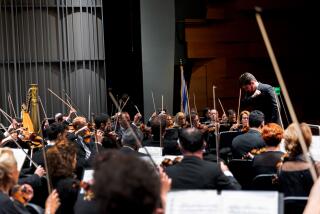MUSIC REVIEWS : A Mixed Recital From Zoltan Kocsis
- Share via
To conclude a challenging recital program Wednesday night, Zoltan Kocsis gave a superb technical demonstration in an otherwise dispassionate performance of three Liszt pieces. The Hungarian pianist’s audience admired the display, however, and accorded him loud and lengthy approbation. He responded with one encore.
The real cause of the ovation, one thinks, may have been Kocsis’ disarming versatility, shown earlier in contrasting works by Beethoven, Schubert and Debussy. In the Dorothy Chandler Pavilion of the Music Center, site of the pianist’s return to the Los Angeles area after eight years away, his eclecticism seemed to be cause for rejoicing.
If the 40-year-old, Budapest-trained pianist ever chooses to specialize in anything, one expects it will be Schubert.
From the evidence of his three-work Schubert group--the C-minor Impromptu, Opus 90, No. 1, the Klavierstuck in E-flat and the E-flat Impromptu, Opus 90, No. 2--he has a close rapport with, and intimate knowledge of, this composer, plus much of the temperament, astuteness and technique to hold these apparently rambling structures together.
Three pieces by Debussy revealed similar expertise, this time utilizing a large palette and several gradations of soft-playing.
Kocsis’ keyboard sound is not always lush or sensuous--indeed, in moments it can turn quite slender and brittle--yet he usually keeps it under tight control, and doles out an admirable simulation of legato. His playing of “D’un cahier d’esquisses,” the Arabesque No. 1 and “Reflets dans l’eau” became demonstrations of a consistently liquid tone and perfectly gauged dynamics.
Not all the possible pianistic colors in Kocsis’ Liszt group materialized; nor did that projection of personality that would have brought seductiveness and charm to their performance make an appearance.
Still, one had to appreciate the non-percussive pleasures in “Les jeux d’eau a la Villa d’Este,” the righteous flourishes of “Sunt lacrymae rerum” and the noble gestures, as well as the immaculate passages, of the “Csardas Macabre,” a lugubrious item perhaps only a Hungarian could love.
At the end of this fascinating program were Beethoven’s very first piano sonata, the one in F minor, Opus 2, No. 1, and a single encore, Bartok’s Bagatelle No. 14.
More to Read
The biggest entertainment stories
Get our big stories about Hollywood, film, television, music, arts, culture and more right in your inbox as soon as they publish.
You may occasionally receive promotional content from the Los Angeles Times.










